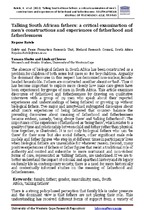Talking South African fathers: a critical examination of men’s constructions and experiences of fatherhood and fatherlessness
Abstract
The absence of biological fathers in South Africa has been constructed as a problem for children of both sexes but more so for boy-children. Arguably the dominant discourse in this respect has demonized non-nuclear, female-headed households. Fathers are constructed as either absent or ‘bad’. Thus it has become important to explore more closely how male care-givers have been experienced by groups of men in South Africa. This article examines discourses of fatherhood and fatherlessness by drawing on qualitative interviews with a group of 29 men who speak about their reported experiences and understandings of being fathered or growing up without biological fathers. Two major and intertwined subjugated discourses about adult men’s experiences of being fathered that counter- balance the prevailing discourses about meaning of fatherhood and fatherlessness became evident, namely, ‘being always there’ and ‘talking fatherhood’. The importance of the experience of fatherhood as ‘being there’, which relates to a quality of time and relationship between child and father rather than physical time together, is illustrated. It is not only biological fathers who can ‘be there’ for their sons but also social fathers, other significant male role models and father figures who step in at different times in participants’ lives when biological fathers are unavailable for whatever reason. Second, many positive experiences of fathers or father figures that resist a traditional role of authority and control and subscribe to more nurturant and non-violent forms of care, represented as ‘talking’ fathers, are underlined. If we are to better understand the impact of colonial and apartheid history and its legacy on family life in contemporary society, there is a need for more historically and contextually informed studies on the meaning of fatherhood and fatherlessness.

